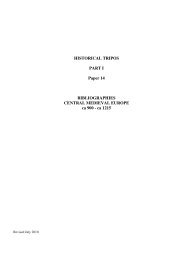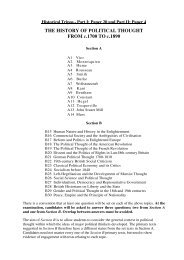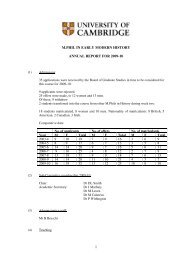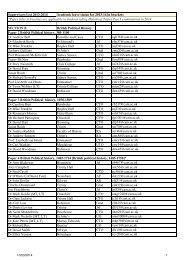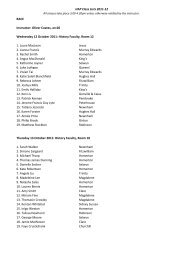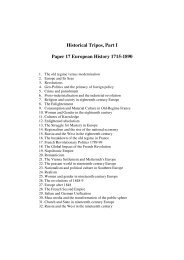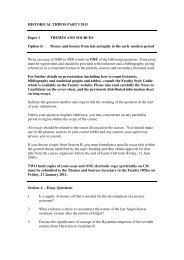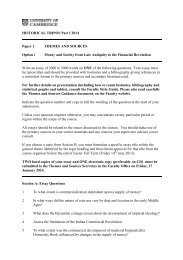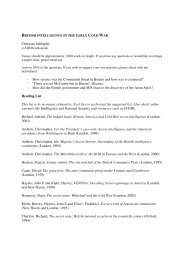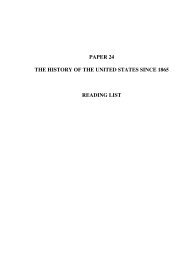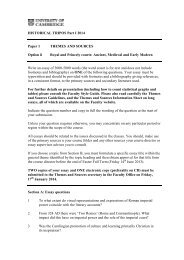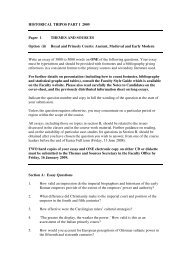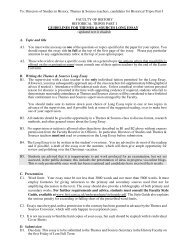Course Handbook - Faculty of History - University of Cambridge
Course Handbook - Faculty of History - University of Cambridge
Course Handbook - Faculty of History - University of Cambridge
You also want an ePaper? Increase the reach of your titles
YUMPU automatically turns print PDFs into web optimized ePapers that Google loves.
context, and to current debate); research content (i.e. identification and study <strong>of</strong> primary sources);<br />
use <strong>of</strong> quantitative methods, where appropriate the work should demonstrate knowledge and<br />
confidence in the use <strong>of</strong> the taught research methods; quality <strong>of</strong> argument (i.e. analysis <strong>of</strong> historical<br />
sources, development <strong>of</strong> analytical arguments demonstrating knowledge <strong>of</strong> qualitative methods, or<br />
reconsideration <strong>of</strong> existing accounts); and awareness <strong>of</strong> limits <strong>of</strong> knowledge.<br />
Candidates are also expected to present work which is clearly and correctly written and which has an<br />
adequate scholarly apparatus. The decision to balance judgment on content and presentation in<br />
marking MPhil essays, on how to mark relatively for weaknesses either <strong>of</strong> argument or <strong>of</strong> prose and<br />
presentation rests with the examiner. Examiners should consider the organization <strong>of</strong> the narrative<br />
and the argument; capacity to summarise findings; style and clarity <strong>of</strong> prose and precision in<br />
documentation (including footnotes and bibliography).<br />
SPECIAL NOTE ON PLAGIARISM, FOOTNOTES AND WORD COUNT:<br />
The word limit <strong>of</strong> 20,000 may not be breached under any circumstances.<br />
The word count must include appendices and statistical tables at 150 words per table, but excludes<br />
all footnotes, references and bibliography. Candidates are required to note the total word count on<br />
the cover sheet bound with the dissertation and to submit an electronic version <strong>of</strong> the dissertation on<br />
a CD so that if necessary the word count may be verified; examiners should note any failure to do so<br />
in their report. The Economic and Social <strong>History</strong> <strong>Course</strong> <strong>Handbook</strong> stipulates:<br />
‘No penalty will be imposed for an excess <strong>of</strong> 50 words (for an essay) or 150 (for a dissertation) over<br />
the maximum word limit, but this allowance should not be abused. The MPhil sub-committee acting<br />
as a Board <strong>of</strong> Examiners has the discretion to penalise essays and dissertations which exceed the<br />
word limit. The word limit (within the 50 / 150 words grace allowance) must therefore be<br />
strictly observed. Students can expect to be severely penalised for exceeding the word limit.<br />
Normally the penalty will be the deduction <strong>of</strong> up to 5 marks from the essay/dissertation, but in<br />
severe cases the work may be marked as failed.<br />
Footnotes should be restricted to the documentation <strong>of</strong> claims and the registration <strong>of</strong> relevant caveats<br />
or observations in relation to the literature. Footnotes must not be used to circumvent the word limit<br />
<strong>of</strong> the essay or dissertation. Students can expect to be severely penalised for abusing the proper use<br />
<strong>of</strong> footnotes in this way. Normally the penalty will be a deduction <strong>of</strong> up to 5 marks from the essay or<br />
dissertation, but in severe cases the essay or dissertation may be marked as failed.’<br />
The <strong>Course</strong> <strong>Handbook</strong>, which is available on the <strong>Faculty</strong> website, also gives clear instructions to<br />
candidates about avoiding plagiarism.<br />
Examiners who believe that a dissertation infringes the course rules in respect <strong>of</strong> plagiarism,<br />
use <strong>of</strong> footnotes, or word count, are required to state this in their report but to award a mark<br />
independent <strong>of</strong> these issues. An Examiner must not penalise an essay. The MPhil Sub-<br />
Committee sitting as Board <strong>of</strong> Examiners will then make a determination <strong>of</strong> whether violation<br />
<strong>of</strong> the rules has occurred and, if so, impose the appropriate penalty. Normally the penalty will<br />
be up to 5 marks, but in severe cases the dissertation may be marked as failed.<br />
4. PART I: INDIVIDUAL ELEMENTS OF ASSESSMENT<br />
4.1 Central Concepts Essay (10%)<br />
This is a term paper <strong>of</strong> up to 3,000 words based on questions dealing with themes discussed in the<br />
sessions, and handed in at the end <strong>of</strong> the Michaelmas term. There will be approximately two<br />
questions per session. The purpose <strong>of</strong> these essays is to examine a central problem or issue discussed<br />
in the relevant secondary literature in a critical way. They should demonstrate sound knowledge <strong>of</strong><br />
the literature in question, but should be more than a narrative summary. The essays are generally<br />
quite broad ranging and should be based both on readings listed in the individual bibliographies for<br />
each session as well as additional more specific readings supplied by the session teachers.<br />
19




